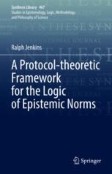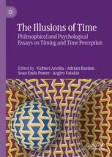Search
Search Results
-
Does everything resemble everything else to the same degree?
According to Satosi Watanabe’s “theorem of the ugly duckling”, the number of predicates satisfied by any two different particulars is a constant,...
-
Map** representational mechanisms with deep neural networks
The predominance of machine learning based techniques in cognitive neuroscience raises a host of philosophical and methodological concerns. Given the...

-
Moving ego versus moving time: investigating the shared source of future-bias and near-bias
It has been hypothesized that our believing that, or its seeming to us as though, the world is in some way dynamical partially explains (and perhaps...

-

-
Aleatoric Propositions: Reasoning About Coins
Aleatoric propositions are a generalisation of Boolean propositions, that are intrinsically probabilistic, or determined by the toss of a (biased)...
-
What chance-credence norms should be
We show a somewhat surprising result concerning the relationship between the Principal Principle and its allegedly generalized form. Then, we...
-
Robust passage phenomenology probably does not explain future-bias
People are ‘biased toward the future’: all else being equal, we typically prefer to have positive experiences in the future, and negative experiences...
-
‘Surabhi Candanam’: the First Acquaintance of Fragrant Sandal: a Problem
Sometimes seeing sandal from non-smellable distance we obtain cognition in the form ‘ surabhi candanam ’ (that sandal out there is fragrant). According...

-
What does causality have to do with necessity?
In her ‘Causality and Determination’, Anscombe argues for the strong thesis that despite centuries of philosophical assumption to the contrary, the...
-
Epistemic Proceduralism Defended II
Epistemic proceduralism is spelled out by clusters of principles characterizing the structure, function, and logic of procedural epistemic norms,...
-
The Mathematics of Text Structure
In previous work we gave a mathematical foundation, referred to as DisCoCat, for how words interact in a sentence in order to produce the meaning of...
-
Permissive Updates
David Lewis asked in “A problem about permission” about the effects on context, specifically on the “sphere of permissibility,” of allowing behavior...
-
Does It Really Seem to Us as Though Time Passes?
It is often assumed that it seems to each of us as though time flows, or passes. On that assumption, it follows either that time does in fact pass...
-
Modelling ourselves: what the free energy principle reveals about our implicit notions of representation
Predictive processing theories are increasingly popular in philosophy of mind; such process theories often gain support from the Free Energy...

-
An Empirical Investigation of the Role of Direction in our Concept of Time
This paper empirically investigates one aspect of the folk concept of time (amongst US residents) by testing how the presence or absence of directedness...

-
Quantum gravity, timelessness, and the folk concept of time
What it would take to vindicate folk temporal error theory? This question is significant against a backdrop of new views in quantum gravity—so-called...
-
Is our naïve theory of time dynamical?
We investigated, experimentally, the contention that the folk view , or naïve theory , of time, amongst the population we investigated (i.e. U.S....
-
Temporal phenomenology: phenomenological illusion versus cognitive error
Temporal non-dynamists hold that there is no temporal passage, but concede that many of us judge that it seems as though time passes. Phenomenal...
-
Normative certitude for expressivists
Quasi-realists aspire to accommodate core features of ordinary normative thought and discourse in an expressivist framework. One apparent such...
-
On the Logic of Theory Change: Partial Meet Contraction and Revision Functions
This paper extends earlier work by its authors on formal aspects of the processes of contracting a theory to eliminate a proposition and revising a...
